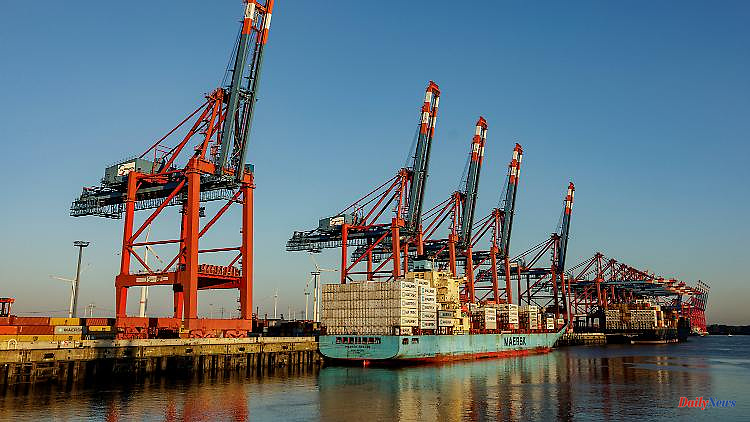The Verdi union is calling on 12,000 workers at German seaports to go on warning strikes. Not many, but enough to paralyze container handling. The strike is likely to hit the imports and exports of the German economy.
Due to another warning strike by dockers, Germany's major seaports are likely to come to a standstill again - this time even for 48 hours. The Verdi union has called on employees to stop working from the beginning of the early shift until Saturday morning. This is intended to increase the pressure again after seven unsuccessful rounds of negotiations in the deadlocked collective bargaining dispute over higher wages. The warning strikes affected all the important ports on the North Sea - in addition to Hamburg, by far the largest German seaport, also Bremerhaven, Bremen, Emden, Wilhelmshaven and Brake, as Verdi negotiator Maya Schwiegershausen-Güth said.
Another walkout in the seaports comes at the wrong time for the port logisticians. Due to the corona virus, there has been a lot of confusion in the global traffic of container and cargo ships for a long time. A renewed warning strike threatens to bring the processes on the quay even more out of step. According to the latest calculations by the Kiel Institute for the World Economy (IfW), more than two percent of global freight capacity is now stuck in traffic jams in the North Sea. Around 20 freighters are currently waiting to be dispatched at anchorages in the German Bight alone, most of them bound for Hamburg. The negotiator for the Central Association of German Seaport Companies (ZDS), Ulrike Riedel, called the call for a strike "irresponsible" in view of the disrupted supply chains to the detriment of consumers and companies.
Previously, the Central Association of German Seaport Companies (ZDS) and Verdi had not been able to reach a tariff compromise acceptable to both sides in a seventh round of negotiations lasting more than eight hours. Both sides are negotiating for around 12,000 employees in 58 collective bargaining companies in Hamburg, Lower Saxony and Bremen. The port workers had already paralyzed the handling of ships twice in June, most recently on June 23 for 24 hours.
Verdi came up with a package of demands that, according to its own statements, would mean pay increases of up to 14 percent over a period of 12 months, depending on the wage group. After several improvements, the ZDS recently put a "final offer" on the table, which the association puts at a volume of up to 12.5 percent for container companies and 9.6 percent for conventional companies, but with a term of 24 months.
The Verdi package of demands, like the ZDS offer, includes several components consisting of an increase in hourly wages, allowances and one-off payments. Verdi negotiator Schwiegershausen-Güth criticized that the current offer was "still insufficient when considering all components". It distributes the risk of price developments, especially in the second year, one-sidedly on the shoulders of the employees. ZDS negotiator Riedel complained that Verdi was insisting on maximum demands, while in comparable sectors wage agreements were currently being concluded with in some cases significantly lower conditions.












